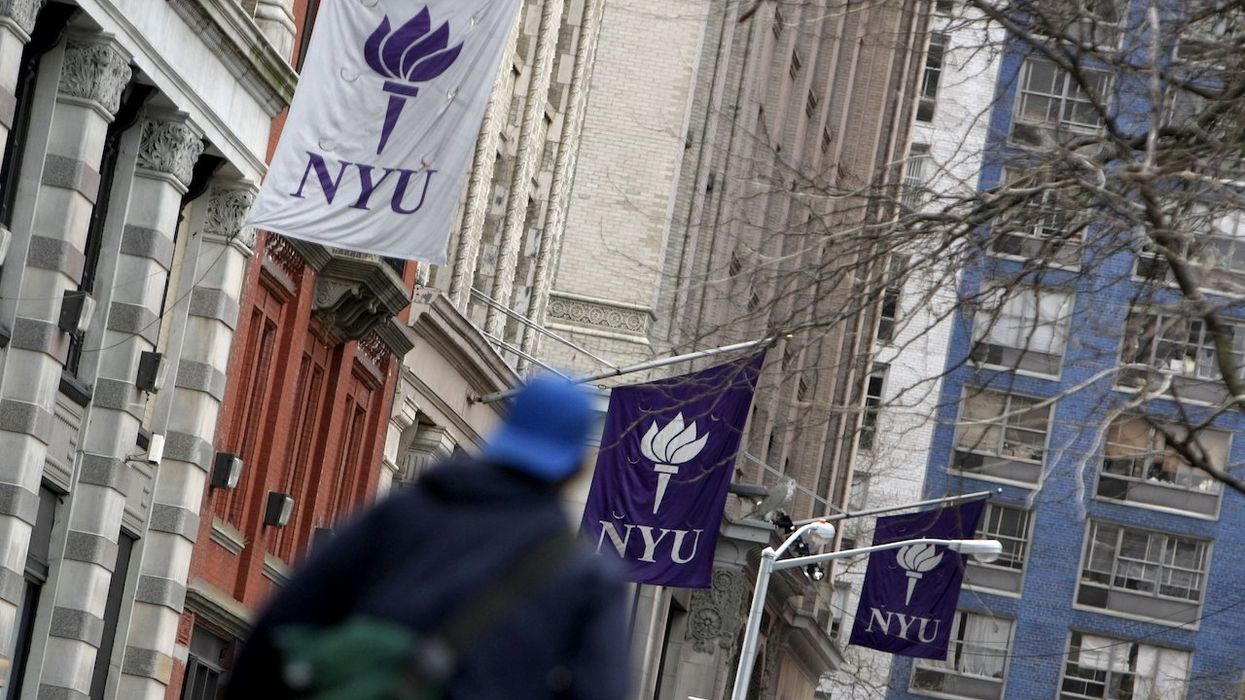The Islamic State of Iraq and Syria's growing strength is no more a threat to America than our so-called Islamic allies in the region. After all, money for ISIS comes from Saudi Arabia and the Gulf emirates. Turkey supplies ISIS with logistical support and safe haven.
ISIS is a consequence of the cross pollination of the austere Saudi-sponsored version of Wahhabi religious Islam and the active political doctrine of the Muslim Brotherhood.
Religious revivals emerge when social and political conditions become conducive to encouraging a people’s religious quest. This was as true of the 1830's revival movement in the United States as it is of the spread of Islamic fundamentalism in the contemporary Middle East.
 This undated file image posted on a militant website on Tuesday, Jan. 14, 2014 shows fighters from Islamic State of Iraq and Syria marching in Raqqa, Syria. (AP Photo/militant website, File)
This undated file image posted on a militant website on Tuesday, Jan. 14, 2014 shows fighters from Islamic State of Iraq and Syria marching in Raqqa, Syria. (AP Photo/militant website, File)
In the United States, the monotony of the urban factory and the hardships of frontier life caused people to search for spiritual meaning beyond the difficulties and unending challenges of day-to-day existence. Similarly, a life lived amid the practices of brutal and corrupt regimes, with endless poverty for the masses, is resulting in the same quest in the Middle East. If the earthly life is unfulfilling, surely the heavenly life will be rewarding.
What is required is a catalyst to transform favorable conditions into a conflagration of revivalism. Oil money has done just that. As students of mass movements have long observed, those with an appetite for mobilization will follow the peddlers of hope with greater alacrity than the peddlers of relief. In the Middle East, the peddlers of hope give you a holy book and a gun to launch a military campaign.
There is no American military solution to this problem. The American public will not permit a re-entry into the Iraqi sectarian quagmire. The Emirates thought they could use ISIS to defeat Iran’s hegemonic design of a Shiite crescent from the Tehran to the Levant. Instead, they inadvertently created another threat.
The Gulf Cooperative Council has been content to create extremist fundamentalist movements far from its borders in an effort to deal with its Shiite rivals. Consequently, it is no accident that Saudi Arabia issued a predictable statement blaming Iraqi Prime Minister Nouri al-Maliki for ISIS’ wanton carnage in Iraq. True, Maliki has been uninterested in forging a multi-ethnic coalition, resulting in American blood and treasure having been squandered to replace the Sunni dictator, Saddam Hussein, with the elected Shiite dictator, Maliki. But to blame Maliki for the savagery of ISIS is a stretch, even by Baghdad Bob’s standards of truth in reporting. It shows the Saudi’s ongoing contempt for the Iraqi prime minister.
 Armed horsemen following an Iraqi flag join Iraqi Shiites of the Mahdi Army militia loyal to cleric Moqtada al-Sadr and vow to fight ISIS in a show of strength in a military parade on June 21, 2014 in the Sadr City district of Baghdad, Iraq. In a lightning advance, the Al Qaeda-inspired Sunni jihadists of the Islamic State in Iraq and the Levant (ISIS) have taken control of western and central sectors of Iraq, and vowed to attack Shiite shrine cities of Karbala and Najaf. Scott Peterson/Getty Images
Armed horsemen following an Iraqi flag join Iraqi Shiites of the Mahdi Army militia loyal to cleric Moqtada al-Sadr and vow to fight ISIS in a show of strength in a military parade on June 21, 2014 in the Sadr City district of Baghdad, Iraq. In a lightning advance, the Al Qaeda-inspired Sunni jihadists of the Islamic State in Iraq and the Levant (ISIS) have taken control of western and central sectors of Iraq, and vowed to attack Shiite shrine cities of Karbala and Najaf. Scott Peterson/Getty Images
The problem for the GCC is that their ISIS Frankenstein has a mind of its own, and successes in Iraq and Syria mean a highly probable attack on the GCC in an effort to fulfill ISIS’ fundamentalist vision of a new caliphate. The problem with building Frankensteins is that after the lightening strikes cause them to rise from the dead, you lose control. ISIS is not behaving like an obedient monster by confining its activities to Iraq and Syria; it is spreading westward in Iraq along the Jordanian border. To ISIS, Jordan is vulnerable as Britain’s bastardized offspring from the Mandate of Palestine.
ISIS is not alone in Iraq. It is receiving strong support from the displaced Sunni military, who might not agree with ISIS’s fundamentalist philosophy, but who have found a common enemy in the Shiite. The Iraq conflagration is another chapter in the centuries old conflict between Sunni and Shiite. And despite pundits’ fantasies of a unique Iran/U.S. alliance to buttress the Maliki government, it isn’t going to happen.
We can legitimately argue if we should have been in Iraq in the first place, what we should have done after the conventional war came to an end, and whether it was smart to leave. But it is absurd to think of going back to be embroiled in the most recent sectarian conflagration that is not remotely in our power to resolve or in our strategic interest to pursue.
ISIS’ brutality should not define our national interest. It is possible to do business with anyone. We do business with China, Cambodia, Vietnam, and Russia. None of these are known for a commitment to human rights.
In the short run, sellers need buyers as much as buyers need sellers. Irrespective of which doctrine of Islamic brutality sits on an energy source, the energy will need to be sent to market.
 Members of the ISIS wave the black terrorist flag while taking control of equipment supplied to the Iraqi forces by the U.S. Source: Twitter.com/@jenanmoussa
Members of the ISIS wave the black terrorist flag while taking control of equipment supplied to the Iraqi forces by the U.S. Source: Twitter.com/@jenanmoussa
In the long run, the Middle East would cease to be important if we surged ahead with the technologies and policies that would produce energy independence in this country and enable us to reach a point where we actually could export crude energy products.
There is no reason to waste more American blood and treasure on Iraq than there was to waste it on Vietnam. If Maliki is threatened by the Sunni fundamentalists, let Iran step into the vacuum as the Shiite's protector. ISIS will find that unlike the Iraqi army, the Iranian Revolutionary Guard will not run and hide from battle. Of course, unlike the Americans, the Iranians, once invited, will not leave.
If the growing victories of the ISIS threaten the GCC, let them solve the problem they created. If there is anything to be learned from our involvement in the Middle East, it is that with all of our expenditure of blood and treasure, we are unable to deflect the political consequences of the rise of Islamic fundamentalism. Whether in Libya, Syria, Iraq, or Afghanistan, the situation after American involvement is every bit as bad as it was before, if not palpably worse.
Those who argue that leaving more American boots on the ground would have stopped ISIS are living in a fantasy world. It would have delayed them. But the corrupt Maliki government that replaced decades of Sunni tyranny with a Shiite government that kept the Sunni from meaningful participation was bound to incur violent opposition.
Democracy is not one elected group dominating the rights of another group.
America has it’s own problems. Let us address them. Let those who seek to destroy us in the name of Allah, however their ideology is nuanced, reap the bounty of the hate they have planted on their own and their neighbors’ soil. Muslims must decide their own future. Let us leave them to it.
Abraham H. Miller is an emeritus professor of political science, University of Cincinnati. He also served on the faculty of the University of California, Davis and the University of Illinois, Urbana.
–
TheBlaze contributor channel supports an open discourse on a range of views. The opinions expressed in this channel are solely those of each individual author.


 This undated file image posted on a militant website on Tuesday, Jan. 14, 2014 shows fighters from Islamic State of Iraq and Syria marching in Raqqa, Syria. (AP Photo/militant website, File)
This undated file image posted on a militant website on Tuesday, Jan. 14, 2014 shows fighters from Islamic State of Iraq and Syria marching in Raqqa, Syria. (AP Photo/militant website, File)
 Armed horsemen following an Iraqi flag join Iraqi Shiites of the Mahdi Army militia loyal to cleric Moqtada al-Sadr and vow to fight ISIS in a show of strength in a military parade on June 21, 2014 in the Sadr City district of Baghdad, Iraq. In a lightning advance, the Al Qaeda-inspired Sunni jihadists of the Islamic State in Iraq and the Levant (ISIS) have taken control of western and central sectors of Iraq, and vowed to attack Shiite shrine cities of Karbala and Najaf. Scott Peterson/Getty Images
Armed horsemen following an Iraqi flag join Iraqi Shiites of the Mahdi Army militia loyal to cleric Moqtada al-Sadr and vow to fight ISIS in a show of strength in a military parade on June 21, 2014 in the Sadr City district of Baghdad, Iraq. In a lightning advance, the Al Qaeda-inspired Sunni jihadists of the Islamic State in Iraq and the Levant (ISIS) have taken control of western and central sectors of Iraq, and vowed to attack Shiite shrine cities of Karbala and Najaf. Scott Peterson/Getty Images
 Members of the ISIS wave the black terrorist flag while taking control of equipment supplied to the Iraqi forces by the U.S. Source: Twitter.com/@jenanmoussa
Members of the ISIS wave the black terrorist flag while taking control of equipment supplied to the Iraqi forces by the U.S. Source: Twitter.com/@jenanmoussa


